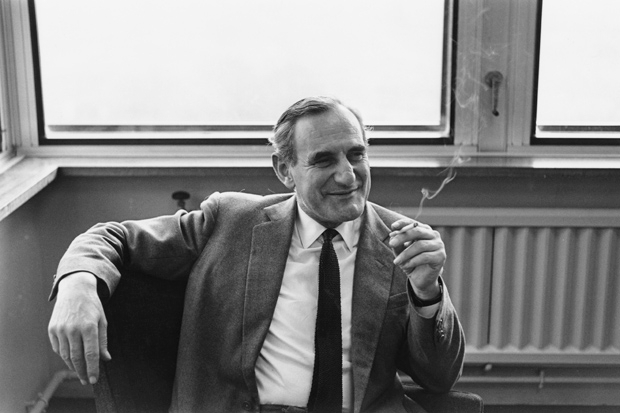When I saw this book, a biography of Huw Wheldon, who was managing director of BBC Television between 1968 and 1975, I thought ‘Aha!’ Inevitably, my mind was filled with images -of Jimmy Savile and Stuart Hall, of the Led Zeppelin guitar riff at the start of Top of the Pops, of the men in charge who had no idea what was going on. Might Wheldon have been one of the guys who had no idea what was going on?
I tried to put this thought to one side. The book is by Wheldon’s son, Wynn. It’s a very moving account of a son’s love and regard for his father. Wynn is telling the story of a man he reveres and misses. He thinks Huw was a wonderful person — charming and brilliant, a huge life force. He believes he was one of those rare people who lives to inspire others.
‘Certainly he was charming,’ he writes. ‘David Attenborough has remarked that Dad could have charmed anyone.’ And then, more darkly, he says: ‘The only wrong step he took was to die too young.’
As I turned the pages, I found myself beguiled by something in Wynn’s words — not exactly the fact of Huw’s greatness, but the strength of Wynn’s feeling. Of course, Huw had an extraordinary life. He was born in 1916 in Wales. He knew Lloyd George. He had a brilliant career. He was knighted. ‘He had six books that I know of dedicated to him, and several poems.’ He was a decorated war hero. ‘I used to envy my father the war,’ says Wynn.
After the war, Huw helped to organise the Festival of Britain and was awarded an OBE. Later, he was a huge force at the BBC, even though he was never director-general. You might say that Huw, as head of documentaries, and then as controller of BBC1, influenced the BBC during its best period – after the Cholmondeley-Warner years, but before the troubling modern era. He was in charge of the arts programme Monitor in the 1960s. Think of Peter Brook, Peter Hall, John Schlesinger, Ken Russell, John Berger, all in bracing black and white. A cultural balancing point; the threshold of a new era.
‘Dad’s edict,’ writes Wynn, ‘was “to make the good popular, and the popular good” ’. He gives us a list of Wheldon–era programmes, including Civilisation, The Ascent of Man, Man Alive, Horizon, Monty Python, Doctor Who and The Old Grey Whistle Test. Huw held a line, you might say, between the ‘Mary Whitehouse brigade’ on the one hand, and something Wynn describes as ‘public humiliation, something he was to loathe in later years in programmes even as seemingly innocent as It’s a Knockout’.
He died aged 69. ‘I do not know precisely what my father died of: it was lung cancer of a complicated sort, or with complications.’ A great man, in the eyes of his son. Not one of the old, snobby types from the BBC’s distant past. Not slick and moneyed, like they are now. But somewhere in between these two things – a man in a tweed jacket, smoking a pipe. Trying to make the good popular, and the popular good, as the world changes around him.





Comments